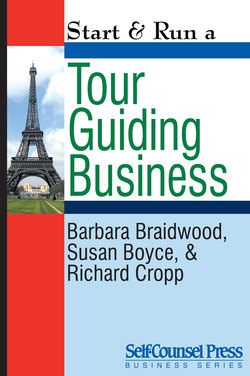Читать книгу Start & Run a Tour Guiding Business - Barbara Braidwood Susan Boyce & Richard Cropp - Страница 55
На сайте Литреса книга снята с продажи.
2. Welcome To Today’s Destination — Providing Commentary
ОглавлениеHow many steps are there to the top of that pyramid? Is the water safe to drink here? How much is this painting worth? What time is dinner tonight? How long did it take to carve Mount Rushmore?
People on tour expect their guide to know everything — everything about getting to the destination, every obscure bit of history, every plan for the future, every species of flora and fauna, even some questions that will leave you shaking your head in bewilderment, like the guide taking a group on a 20-minute ocean ferry ride who was asked how far above sea level they were.
All right, so you don’t know the juicy details about the miller’s daughter who had an affair with the lord of the manor’s son in 1567. What do you tell the tourist who is not going to be happy until you have given an answer?
At one time people said, “If you don’t know, smother your guilt and feelings of inadequacy, remember it’s a losing battle to keep ahead of all the questions, and fake it.” Tales with sex, thievery, and religious persecution are hard to check and sound plausible almost everywhere. The danger of this approach is that a different version of the story may show up on the postcard rack at the next stop. A better, more professional approach is simply to admit you don’t know but will make every attempt to find out — and then follow through!
One guide taking a group of German tourists around the lakes of central British Columbia was asked a technical question about tying flies for fly-fishing. The guide was not a fisherman, so he didn’t know the answer. That evening he checked with a local fishing enthusiast who not only supplied the answer but also passed on a copy of The Fisherman’s Calendar for the upcoming year. The German was ecstatic and the guide learned something new about a popular subject.
Of course, it helps if you are a historian or have already made many trips to the area you are traveling through. But even if you aren’t or haven’t, there is an easy solution. Read, read, read before arriving at any destination. Most guides already have a passionate interest in the areas they travel to, so research is a pleasure, not a chore. With minimal effort you will discover hundreds of excellent guidebooks on popular destinations and almost as many on most of the obscure ones. Several lightweight reference books can be tucked into a guide’s shoulder bag or kept close at hand on the office bookshelf. To start off your own resource library, here are some names to watch for:
• Baedeker publications
• Berlitz’s Executive Travel Guides
• Birnbaum guides
• Canadian and American Automobile Association publications
• Fielding’s guides
• Fodor’s travel guides
• Frommer’s Comprehesive Guides
• Michelin guides
• Passports Illustrated Travel Guides (from Thomas Cook)
• Rick Steves’ European travel guides
• Triptiks road map and guide books
• Tourism and tourist bureau publications
For entertaining and obscure facts, the Guinness Book of Records is often overlooked, as are a host of other trivia books. If you want to add some lighthearted anecdotes, these books can be fun and educational.
Experts are often willing to share information and personal experiences which add a special dimension to your commentary. See if you can arrange a tour with, or a brief talk from, someone at the local archives, museum, weather bureau, college, indigenous peoples’ organization, forestry and parks department, theater and entertainment facilities, or even religious institutions. Go ahead, ask for an hour of the planetarium curator’s time or for a backstage tour of the Metropolitan Opera. The worst that can happen is the person will be too busy or say no.
Keeping current is essential to your success. Tourism offices, visitors’ bureaus, and chambers of commerce help you keep up to the minute about an area. Radio and TV broadcasts, magazines, and the local daily newspapers are sources of current information, but so are the “freebies” published in most towns and cities. Don’t thumb your nose just because they don’t cost anything.
What kind of information do people want? Someone will eventually ask you for anything you can think of — and much that you cannot imagine — but there are a few standard questions you need to prepare yourself for.
